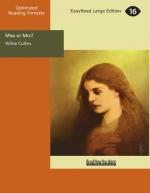In the meanwhile the talk proceeded among the other persons at the breakfast-table. Miss Lavinia addressed herself to Launce.
“Do you know, you careless boy, you gave me a fright this morning? I was sleeping with my cabin window open, and I was awoke by an awful splash in the water. I called for the stewardess. I declare I thought somebody had fallen overboard!”
Sir Joseph looked up briskly; his sister had accidentally touched on an old association.
“Talk of falling overboard,” he began, “reminds me of an extraordinary adventure—”
There Launce broke in, making his apologies.
“It shan’t occur again, Miss Lavinia,” he said. “To-morrow morning I’ll oil myself all over, and slip into the water as silently as a seal.”
“Of an extraordinary adventure,” persisted Sir Joseph, “which happened to me many years ago, when I was a young man. Lavinia?”
He stopped, and looked interrogatively at his sister. Miss Graybrooke nodded her head responsively, and settled herself in her chair, as if summoning her attention in anticipation of a coming demand on it. To persons well acquainted with the brother and sister these proceedings were ominous of an impending narrative, protracted to a formidable length. The two always told a story in couples, and always differed with each other about the facts, the sister politely contradicting the brother when it was Sir Joseph’s story, and the brother politely contradicting the sister when it was Miss Lavinia’s story. Separated one from the other, and thus relieved of their own habitual interchange of contradiction, neither of them had ever been known to attempt the relation of the simplest series of events without breaking down.
“It was five years before I knew you, Richard,” proceeded Sir Joseph.
“Six years,” said Miss Graybrooke.
“Excuse me, Lavinia.”
“No, Joseph, I have it down in my diary.”
“Let us waive the point.” (Sir Joseph invariably used this formula as a means of at once conciliating his sister, and getting a fresh start for his story.) “I was cruising off the Mersey in a Liverpool pilot-boat. I had hired the boat in company with a friend of mine, formerly notorious in London society, under the nickname (derived from the peculiar brown color of his whiskers) of ‘Mahogany Dobbs.’”
“The color of his liveries, Joseph, not the color of his whiskers.”
“My dear Lavinia, you are thinking of ‘Sea-green Shaw,’ so called from the extraordinary liveries he adopted for his servants in the year when he was sheriff.”
“I think not, Joseph.”
“I beg your pardon, Lavinia.”
Richard Turlington’s knotty fingers drummed impatiently on the table. He looked toward Natalie. She was idly arranging her little morsels of ham in a pattern on her plate. Launcelot Linzie, still more idly, was looking at the pattern. Seeing what he saw now, Richard solved the problem which had puzzled him on deck. It was simply impossible that Natalie’s fancy could be really taken by such an empty-headed fool as that!




